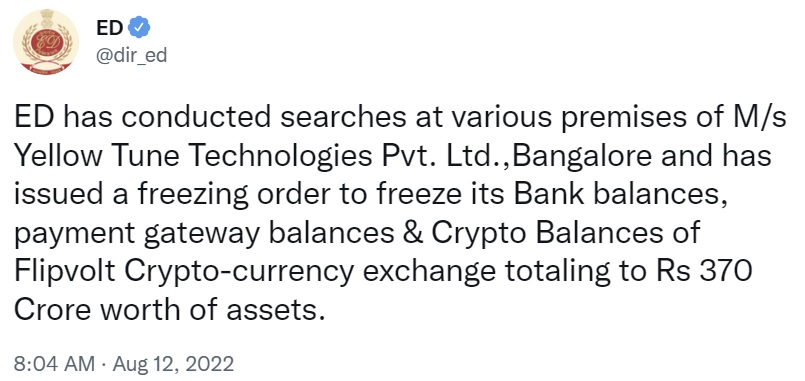
India’s Enforcement Directorate (ED) has frozen crypto exchange Vauld’s crypto and bank assets worth about INR 370 crore ($46,439,181). Vauld halted deposits and withdrawals last month. The Indian law enforcement agency is reportedly investigating more than 10 cryptocurrency exchanges.
Indian Authority Freezes Another Cryptocurrency Exchange’s Assets
The Enforcement Directorate (ED), a law enforcement and economic intelligence agency of the government of India, has frozen the assets of another cryptocurrency exchange.
The agency announced Friday that it has conducted searches at various premises of Yellow Tune Technologies in Bangalore and has issued an order to freeze its bank balances, payment gateway balances, and crypto balances of Flipvolt Technologies’ crypto exchange totaling 370 crore rupees ($46,439,181) worth of assets. Flipvolt Technologies is the India-registered entity of Singapore-headquartered Vauld, a cryptocurrency trading, borrowing, and lending platform.
ED explained that approximately 370 crore rupees were deposited by 23 entities into the INR wallets of Yellow Tune Technologies held with Flipvolt Technologies’ crypto exchange. These amounts were “proceeds of crime derived from predatory lending practices,” the authority said, elaborating:
Yellow Tune by using the assistance of Flipvolt crypto exchange … assisted the accused fintech companies in avoiding regular banking channels, and managed to easily take out all the fraud money in the form of crypto assets.
The agency alleged that Flipvolt “has very lax KYC [know-your-customer] norms, no EDD [enhanced due diligence] mechanism, no check on the source of funds of the depositor, no mechanism of raising STRs [suspicious transaction reports].”
In addition, Flipvolt failed to give the complete trail of crypto transactions made by Yellow Tune Technologies and could not supply any form of KYC of the opposite party wallets, ED noted.
The authority concluded that “by encouraging obscurity and having lax AML [anti-money laundering] norms,” the crypto exchange “has actively assisted Yellow Tune in laundering the proceeds of crime worth 370 crore rupees using cryptocurrency,” adding:
Therefore, equivalent movable assets to the extent of Rs 367.67 crore lying with Flipvolt crypto exchange in the form of bank and payment gateway balances worth Rs 164.4 crore and crypto assets lying in their pool accounts worth Rs 203.26 crore are frozen under PMLA, 2002, till complete fund trail is provided by the crypto exchange.
Vauld’s website explains that “As soon as a user deposits funds to their Vauld wallet, it goes to a centralized pool.” From this pool, the funds are allocated for lending and trading. PMLA, 2002, is India’s Prevention of Money Laundering Act.
The crypto exchange told Businesstoday: “We are investigating this matter, we kindly request your patience and support, we will keep you updated as soon as we have more information on this.”
After halting deposits and withdrawals last month, Vauld announced a restructuring plan on July 4 due to “financial challenges” it faced in recent months. Defi Payments Pte Ltd., the entity that operates Vauld in Singapore, also applied for court protection from legal proceedings being commenced against it. The exchange is currently not licensed in Singapore.
In July last year, Vauld raised $25 million in a Series A funding round for its India-based borrowing and lending platform. The round was led by Valar Ventures, a U.S.-based venture capital fund co-founded by billionaire Peter Thiel. Pantera Capital, Coinbase Ventures, CMT Digital, Gumi Cryptos, Robert Leshner, Cadenza Capital, and others also participated in the round.
Last week, ED announced that it has frozen the bank assets of Wazirx, a major crypto exchange in India. The authority detailed that it conducted searches on one of the directors of Zanmai Labs, which owns Wazirx, and issued an order to freeze the exchange’s bank balances to the tune of INR 64.67 crore.
ED similarly explained that the action against Wazirx is part of a money laundering investigation involving non-bank financial companies (NBFC) and their fintech partners for “predatory lending practices in violation of the RBI [Reserve Bank of India] guidelines.”
In addition, the Economic Times reported Thursday that ED is probing at least 10 cryptocurrency exchanges for allegedly laundering more than INR 1,000 crore. The crypto trading platforms allegedly did not conduct adequate due diligence and failed to file suspicious transaction reports.
What do you think about India freezing bank accounts of cryptocurrency exchanges? Let us know in the comments section below.

Comments
Post a Comment